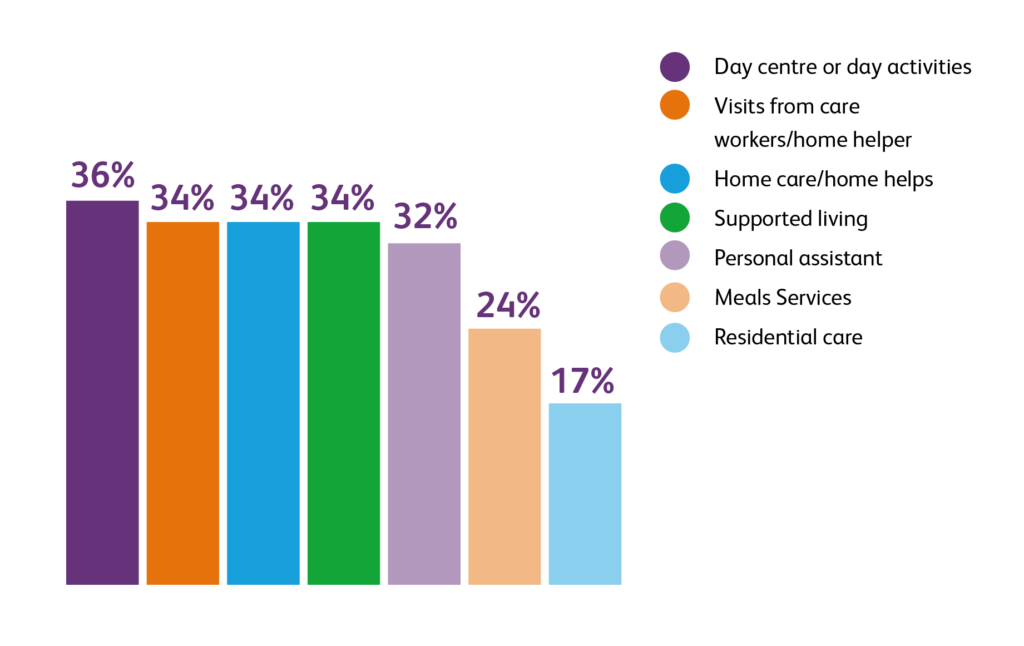What people with complex disabilities want from social care
For the 2023 update to our Potential and Possibility research, we asked participants about their experiences of social care.
We found that there is no one-size-fits-all approach to social care for people with complex disabilities.
Read on to find out what our participants had to say.
Support that people with complex disabilities need
“[I need] people that listen and understand that we are not all the same and that we need help specifically for the individual and not one size fits all.”
Our research found that the most common areas where people with complex disabilities needed day-to-day support were:
- Doing practical task outside the home (40%).
- Practical tasks around the home (36%).
- Managing money (31%).
- Seeing or contacting friends and family (27%).
Which activities do people with complex disabilities need support to carry out?
| Doing practical tasks outside the home (for example, food shopping) | 40% |
| Doing practical tasks at home (for example, preparing food) | 36% |
| Transport and getting around outside the home | 34% |
| Help with managing money | 31% |
| Seeing or contacting friends and family | 27% |
| Support taking medication or using medical equipment at home | 26% |
| Going to work, volunteering, education or training | 26% |
| Personal care (for example, bathing and dressing) | 25% |
| Communicating with others (for example, support from an interpreter) | 25% |
| Mobility and getting around at home | 21% |
| No support needed for the activities listed above | 1% |
| Other | 1% |
These results highlight how important it is for people with complex disabilities to have practical support for their autonomy and independence.
People with complex disabilities were most likely to receive practical support from their family. 36% of people with complex disabilities had support with practical tasks from their parent/carer, another family member (28%) or a friend (27%).
Only a quarter of people with complex disabilities (25%) received practical support from social care.
Our research has highlighted that no one size fits all people with complex disabilities when it comes to the support they need from social care.
The support varied from going to day centres/day activities (36%), having a personal assistant (32%) and receiving a meals service (24%). Only 17% were in residential care.
What best describes the care or support services people with complex disabilities receive?

| Day centres or day activities (for example, fitness or music classes) | 36% |
| Visits from care workers/home helpers | 34% |
| Home care/home help | 34% |
| Supported living | 34% |
| Personal assistant | 32% |
| Meals services | 24% |
| Residential care | 17% |
| Other | 3% |
| Prefer not to say | 2% |
Our results show how important it is that social care is delivered in a way that fits the individual needs and hopes of the person.
People with complex disabilities talked about the importance of having the right support to meet their needs and being seen as an individual.
61% of people with complex disabilities felt they had a better quality of life because of the care and support they receive.

“Good social care would mean having consistent carers who know my needs and fulfil them. There would be an appropriate level of staffing so I can access the community more without having to rely on family.”
Susie (completed on her behalf by Caroline)
“Being able to receive the proper care and requirements to help me live a comfortable and enjoyable life filled with love and care.”
“Social care that understands the duties of the Care Act relevant to deafblind people. That they must be specifically trained and able to assess. This is still not widely understood. Deafblind qualified assessors are the route to good care and support for me.”
“Care that actually supports someone in all aspects of their life, about having the life you want (within reason), being able to choose who does your care, not placing the burden on family carers as it’s not a choice to care as they love me.”
66% of people with complex disabilities who receive social care reported that they were satisfied or very satisfied with the care and support they receive.
“Being able to receive the proper care and requirements to help me live a comfortable and enjoyable life filled with love and care.”
Yet one in five (21%) people with complex disabilities felt they didn’t have the right care and support to meet their needs.
Some people with complex disabilities who received social care experienced issues with their care. Over the last 12 months, nearly a third of people with complex disabilities who receive social care (31%) experienced staff shortages.
A quarter of people with complex disabilities (25%) experienced cuts to their social care provision, difficulty in getting their care and support plan funded by local authority and cuts to the funding of the care and support services that they receive.
About this research
Potential and Possibility is an annual piece of research on the experiences and aspirations of people with complex disabilities. The research involves polling, our own survey and insights from audits of Sense services. This year (2023) is the second year we have carried out this research.
These pages reflect the latest information from our 2023 research, building on our findings from 2022.
If you have any questions about the research please contact [email protected].

